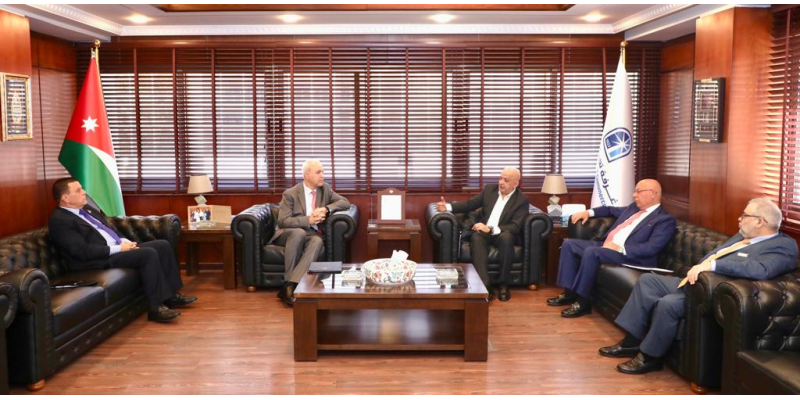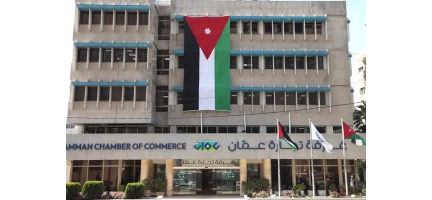We have lost economic opportunities with Turkey
01/10/2023
We have lost economic opportunities with Turkey
The Chairman of the Amman Chamber of Commerce, Khalil Haj Tawfiq, confirmed that there are lost economic opportunities for Jordan in terms of exporting goods, services and agricultural products to Turkey, or through its lands to the Balkan countries.
During his meeting at the Chamber’s Premises, the Jordanian Ambassador-designate to Turkey, Hazem Al-Khatib, stressed the necessity of accelerating the establishment of a comprehensive Jordanian exhibition in Istanbul to promote Jordanian products in a way that helps open trade and investment partnerships with the Turkish side and diversify the base of exported goods.
According to a statement by the chamber, Haj Tawfiq expressed the Chamber's appreciation for the role of Jordanian diplomatic missions in countries around the world and the great interest of the embassies in providing all facilities to the delegations of the chambers of commerce and ensuring the success of their economic missions.
He stressed that the Amman Chamber of Commerce will work to activate the memoranda of understanding that links it with the Turkish chambers of commerce, especially the Istanbul Chamber of Commerce, which is considered one of the largest chambers of commerce in the world, which will reflect on the development and development of the two countries’ trade and investment relations, and the increase of Turkish investments in the Kingdom.
He explained that the Jordanian embassy in Ankara has the ability to put economic relations back on the right track because the Jordanian commercial and service sector is fully convinced that the Kingdom has an economic interest with Turkey, stressing the necessity of cooperation between the embassy and chambers of commerce to network business communities, build partnerships and exchange experiences.
He pointed out the necessity of reformulating a new free trade agreement with Turkey, within new frameworks and conditions, and involving the private sector when preparing it to ensure the preservation of common interests, achieving justice for the two countries, and increasing Jordanian exports to the Turkish market.
Haj Tawfiq stressed that the free trade agreement that linked the two countries was for the benefit of the Kingdom, as it contributed to significantly increasing exports, which had begun to decline in recent years.
It is noteworthy that the volume of trade exchange between the two countries amounted to approximately one billion dollars during the past year, including 909 million dollars of Jordanian imports from the Turkish market.
For his part, Ambassador Al-Khatib stressed the importance of the role played by Jordanian diplomatic missions to support comprehensive economic development programs through their continued cooperation with the commercial sector and various private sector institutions, indicating that the Jordanian embassy will work to promote investment opportunities and market the Jordanian product to increase Jordanian exports to the Turkish market.
Al-Khatib pointed out the importance of unifying efforts between the embassy and the private sector with its various bodies to develop the Kingdom’s international economic relations, activate trade and investment agreements signed with many countries and blocs, and highlight Jordan’s cultural image and the great opportunities and capabilities available.
In turn, the First Vice Chairman of the Amman Chamber of Commerce, Nabil Al-Khatib, and Board of Directors member, Khattab Al-Banna, indicated that the private sector is keen to strengthen its relations with Jordanian embassies on the economic level, due to the importance of their role in promoting Jordanian exports, enhancing trade exchange, attracting foreign investments, and introducing Jordan’s economic capabilities and potential.
During the meeting, which was attended by the Director General of the Chamber, Hisham Al-Dweik, they pointed out that Jordan has a distinguished strategic location that qualifies it to be a gateway for foreign investments and the marketing of their products in the Middle East region, in addition to its tourism components, especially religious ones.
They stressed the necessity of developing the concept of marketing “educational tourism” and promoting it to the Turkish side and attracting thousands of Turkish students to study the Arabic language in the Kingdom, which will reflect positively on various economic sectors.
Al-Khatib and Al-Banna pointed out that there was a significant decrease in the costs of sea freight for goods and commodities coming to the Kingdom from Turkey, calling for the necessity of activating the sea transport line (Ro-Ro), between the Turkish ports and the port of Aqaba, and re-operating low-cost airlines between the two countries.



